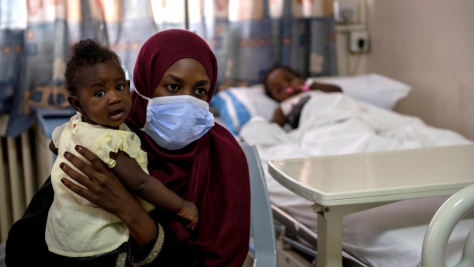Men, women and children suffering from harsh physical conditions and legal shortcomings at Pacific Island asylum centres: UNHCR reports
This is a summary of what was said by UNHCR spokesperson Adrian Edwards – to whom quoted text may be attributed – at today's press briefing at the Palais des Nations in Geneva.
In two reports released today, UNHCR finds that asylum-seekers transferred from Australia to processing centres at Nauru and Manus Island in Papua New Guinea (PNG) are living in arbitrary detention in conditions that do not meet international standards of treatment.
UNHCR understands Australia's determination to respond robustly to the challenges of people smuggling and to dissuade people from undertaking dangerous irregular travel by sea. However we believe those responses must not neglect the compelling protection needs, safety and dignity of the individuals affected.
These reports are also in the context of what UNHCR has observed to be a sharp deterioration during 2013 in the overall quality of protection and support available to asylum-seekers and refugees who come to Australia by boat. It remains the case that when policies and practices are based primarily on deterrence, they can have harmful and, at times, punishing consequences for people affected, particularly families and children.
The reports identify troubling shortcomings at both centres, and urge all three States involved to consider the findings and recommendations and act upon them.
In both Nauru and PNG the current policies, operational approaches and harsh physical conditions at the centres not only do not meet international standards - they also have a profound impact on the men, women and children housed there.
UNHCR is concerned that they constitute mandatory detention which is not compatible with international law. We are also worried that they do not provide a fair and efficient system for assessing refugee claims, do not provide safe and humane conditions of treatment in detention, and do not provide for adequate and timely solutions for recognized refugees.
With the Nauru report, it acknowledges some positive developments since our last visit in March. However, there have also been significant setbacks in refugee processing, and a deterioration in reception conditions. Despite a processing system being in place under Nauru law, only one decision has been handed down in the 14 months since the centre reopened.
No decisions at all have been finalized at the centre in PNG, and while some improvements were observed since UNHCR's last inspection in June, the physical conditions within detention, together with the slowness of processing and the lack of clarity regarding safe and sustainable solutions for refugees were likely, together, to have a serious and negative effect on the health and welfare of people transferred from Australia.
At both centres, the psycho-social well-being of vulnerable people - including survivors of torture and trauma and unaccompanied children - is an issue of concern. UNHCR also called on all three States not to transfer children, particularly those who are unaccompanied, unless and until there has been a marked improvement in conditions in both centres.
UNHCR is particularly concerned by the impact of policies that will prevent recognized refugees from finding safe, dignified and sustainable solutions in the medium to long term. The prospect for refugees in PNG finding permanent protection there presents formidable challenges, and it is clear that Nauru will offer only very limited opportunities for refugees even in the shorter term.
UNHCR believes the arrangements at Nauru and PNG would benefit from a much clearer articulation of the policy and operational framework that would set out how, when and where refugees will be able to secure protection and exercise the rights required under the 1951 Refugee Convention.
The full reports, including recommendations, are available at: www.unhcr.org.au
For more information on this topic, please contact:
- In Canberra (Regional): Ben Farrell on mobile +61 407 971 686
- In Geneva: Adrian Edwards on mobile +41 79 557 91 20
- Babar Baloch on mobile +41 79 557 9106
Related news and stories
Global photo project shows power of football during displacement
The Kenyan powerhouse improving women's lives in Australia
UN refugee chief welcomes cities' support for refugees
UNHCR appeals to Australia to act and save lives at immediate risk
UNHCR urges Australia to end separation of refugee families
'We must believe we can make a difference and we can do things better' - Andrew Harper
-

Urgent support needed to help Ethiopian refugees reaching Sudan
20 Nov 2020 -

Asylum-seekers tell of relief as they leave Libya for Rwanda
20 Nov 2020 As life-saving evacuation flights to Rwanda resume after nearly a year-long hiatus due to COVID-19, vulnerable asylum seekers put their ordeals in Libya behind them. -

Life-saving evacuations from Libya to Rwanda resume after nearly a year
20 Nov 2020 -

UNHCR's Human Rights Engagement Strategy: 2020-2023
19 Nov 2020 -

UNHCR warns 2020 risks lowest resettlement levels in recent history
19 Nov 2020 -

'Leave no one behind' in national health plans - UNHCR Assistant High Commissioner for Operations
19 Nov 2020 Addressing this year's High Commissioner's Dialogue on Protection, Raouf Mazou shines a spotlight on the need for inclusion when it comes to health policies. -

'It was a very emotional moment … I felt that now I definitely exist'
18 Nov 2020 After a lifetime of statelessness, Linda finally gained Russian citizenship in 2018. But hundreds of thousands of others across Europe still struggle to attain that basic right. -

Integrating Non-communicable Disease Care in Humanitarian Settings, 2020 (PDF)
18 Nov 2020 The purpose of this document is to serve as an operational guide for public health staff of humanitarian organizations providing healthcare in humanitarian settings, in order to ensure that care for persons with noncommunicable disease is included and integrated within the primary health care services. -

UNICEF - Resilience and Inclusion in Health Session High Commissioner Dialogue
18 Nov 2020
